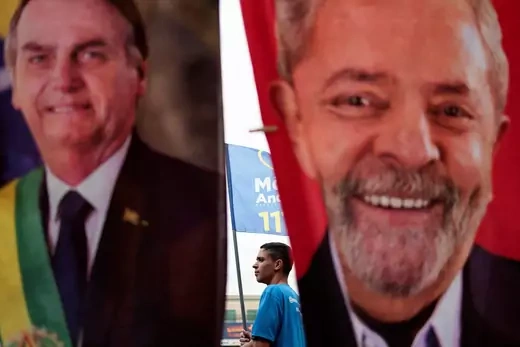Bolsonaro vs. Lula: What’s at Stake in Brazil’s 2022 Election
Brazil’s presidential election is down to two polarizing candidates, and experts say the runoff will be a major test for one of the world’s largest democracies.
Brazilian voters will return to the polls for a presidential runoff after neither of the leading candidates managed to secure enough support to win the election earlier this month. On October 30, former President Luiz Inácio Lula da Silva (commonly known as Lula) of the left-wing Workers’ Party (PT) will face incumbent Jair Bolsonaro of the conservative Liberal Party (PL). The candidates represent starkly different visions for Brazil, and experts broadly agree that the result will test the strength of Brazil’s democracy.
What are voters’ main concerns?
According to the latest national survey [PDF] carried out by private polling firm Quaest Consultoria, Brazilians’ top concerns are the economy, social issues including public health, and corruption; other worries include crime and education.
Brazil is recovering from the effects of its worst-ever recession, which began in 2014, and the country continues to struggle with limited growth and high inflation. Brazil is also still grappling with the COVID-19 pandemic and its fallout, such as increased poverty and an ongoing education crisis. Meanwhile, the country’s high rates of violent crime—including murder, robbery, and kidnapping—persist.
What have the candidates promised?
Jair Bolsonaro. A former army captain and congressman, Bolsonaro won the 2018 presidential election campaigning as a right-wing, socially conservative nationalist. He promised to tackle crime and corruption and boost economic growth. However, his tenure has featured many controversial decisions, including cutting funding for federal education, relaxing gun ownership laws, and weakening LGBTQ+ and reproductive rights. He has also drawn international criticism for his treatment of Indigenous communities and the Amazon Rainforest, as well as for his management of the COVID-19 pandemic, which has killed more than 687,000 people in Brazil.
His reelection campaign has emphasized his socially conservative platform, including his opposition to abortion, transgender rights, legalized drugs, and restrictions on freedom of religion and speech. He also positions himself as the business-friendly candidate, backing a more open-market economy and the privatization of state companies.

Luiz Inácio Lula da Silva. One of the most popular leaders in Brazilian history, Lula served two terms as president between 2003 and 2010, presiding over an economic boom that lifted tens of millions of Brazilians out of poverty. He was later imprisoned on corruption charges as part of a sweeping national investigation, though the conviction was later annulled.
Lula’s Workers’ Party, with its roots in the labor union movement, casts itself as a champion of economic and social justice. In particular, Lula has prioritized tackling low growth, inequality, and a worsening hunger crisis. He says if he’s reelected, he will increase direct cash transfers, expand social housing, and introduce a debt forgiveness program. He has also pledged to eliminate the cap on public spending, increase taxes on the wealthy, and strengthen conservation efforts in the Amazon.
What do the election results mean for Brazil’s democracy?
Some experts say the close result on October 2—especially after public polling consistently showed lower support for Bolsonaro than he won in the vote—underscores Brazil’s sharp political polarization. (In public polling ahead of the second round, Lula has maintained a lead of between 3 and 6 percent.) Low voter turnout also signaled growing dissatisfaction: at 21 percent, it was the lowest since 1998.
Meanwhile, Bolsonaro’s conservative party outperformed in congressional elections, gaining at least seven additional seats and earning a majority. That could give Bolsonaro’s supporters momentum and make it more difficult for Lula to implement left-wing policies if elected. “The extreme right is very strong across Brazil,” Carlos Melo, a political science professor at the Insper Institute of Education and Research in São Paulo, told Reuters. “Lula’s second-round victory is now less likely.”
Tensions could worsen around the runoff, after the first round saw worrying acts of political violence among supporters of both candidates, including several murders. Second-round campaigning was marked by a violent attack against police by one of Bolsonaro’s allies. Democracy watchdogs warn that disinformation is prevalent on social media, while Bolsonaro has questioned the integrity of the electoral process and made unsubstantiated claims of fraud in electronic voting machines. This has raised fears that, if he loses, Bolsonaro and his allies will not accept the result.
What’s at stake for Brazil’s role in the world?
Bolsonaro and Lula differ widely on foreign policy. Breaking with most of his predecessors, Bolsonaro has embraced anti-globalist rhetoric and blamed international institutions for jeopardizing Brazil’s sovereignty. He has distanced Brazil from the United Nations and threatened to withdraw from the World Health Organization and the Paris Agreement on climate. His administration has also sought to isolate former partners, namely Cuba and Venezuela, and form closer ties with like-minded leaders, such as former U.S. President Donald Trump and Russian President Vladimir Putin. Bolsonaro has also disparaged China’s influence and feuded with U.S. President Joe Biden.
In contrast, Lula has pledged to return Brazil to its more traditional role as a supporter of regional multilateral institutions. His victory would add Brazil to the growing list of Latin American countries—including Chile and Colombia—that have chosen left-wing candidates in recent elections. Some observers say the result would likely be an increase in cooperation between Brazil and lower-income countries, often referred to as the Global South; warmer relations with the United States and European Union; and a rekindling of Brazil’s leadership role in regional affairs.
Will Merrow made the graphic for this In Brief.